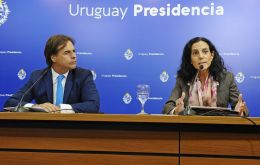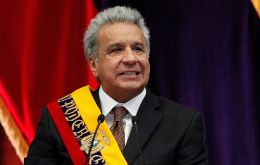MercoPress. South Atlantic News Agency
Tag: fiscal deficit
-
Thursday, July 11th 2024 - 21:40 UTC
Uruguay faces persistent fiscal deficit: Levels match end of previous administration

The fiscal deficit in Uruguay has reached levels comparable to those at the end of the previous leftist Frente Amplio's administration, posing a significant challenge to the current government a few months before the next elections. The latest data, adjusted for extraordinary factors such as the pandemic, indicates that the consolidated fiscal deficit stands at 4.4% of GDP, mirroring the 2019 figures.
-
Wednesday, January 13th 2021 - 09:10 UTC
Strong rebound of Peruvian economy in the next five years

The economy of Peru, the world’s second largest copper producer, is expected to grow an annual average of 5.1% between 2021 and 2026, the economy ministry said on Tuesday
-
Saturday, October 17th 2020 - 09:57 UTC
Argentine economy minister confident it can maintain the current exchange rate policy

Argentine Economy Minister Martin Guzman said on Friday the country has the necessary instruments to maintain the current exchange rate policy, despite tumbling foreign reserves and a ballooning gap between the official and informal peso exchange rates.
-
Wednesday, October 7th 2020 - 09:40 UTC
Brazilian economy minister and Lower House speaker agree to push reform agenda and social program

Brazil’s Economy Minister Paulo Guedes and the powerful lower house Speaker Rodrigo Maia announced a truce after more than a month of bickering over reforms and how to tackle a widening fiscal deficit. Local markets rallied.
-
Wednesday, November 6th 2019 - 09:49 UTC
Bolsonaro unveils fiscal reforms and sends bill to privatize Brazil's largest utility, Electrobras

Brazilian President Jair Bolsonaro's government unveiled a bundle of wide-ranging reforms on Tuesday, aimed at cutting spending and reducing the size of the state to drive down its chronic fiscal deficit.
-
Friday, October 4th 2019 - 09:55 UTC
Ecuador will eliminate fuel subsidies and tighten the belt of public employees

Ecuadorean President Lenin Moreno said that his government will eliminate subsidies for diesel and low-octane gasoline and create a new corporate tax as part of a package of measures to narrow the country’s fiscal deficit.
-
Wednesday, June 5th 2019 - 21:00 UTC
Uruguay: Finances don't grow; Economy Minister estimates an improvement for the second semester, as Macri did

Uruguay is experiencing, in recent months, a marked drop in investment and the generation of employment. Uruguayan Economy Minister Danilo Astori admitted Wednesday the fall of public accounts, with an annualized fiscal deficit in April that was 4.8% of GDP, and opted to provide greater incentives to investors and entrepreneurs. The Uruguayan press accuses the government of betting on the hope that the results will begin to be felt in the second half of the year, as it was heard a while ago in Argentina under the administration of President Mauricio Macri.
-
Tuesday, April 23rd 2019 - 09:18 UTC
Argentina managed a quarterly primary surplus during the first quarter

Argentina ran a primary fiscal deficit of 13.037 billion pesos (US$ 305.32 million) in March, the country’s Treasury minister Nicolás Dujovne said at a press conference on Monday, though posted a first-quarter surplus of 10.347 billion pesos.
-
Friday, February 1st 2019 - 11:10 UTC
Brazil's fiscal deficit in December, a challenge for Bolsonaro and the new Congress

The Brazilian government posted a fiscal deficit of 41.13 billion reais (US$ 11.27 billion) in December, the third widest monthly deficit on record, the central bank said on Thursday. While it was in line with forecasts and amplified by seasonal factors, the shortfall highlights the challenge of exerting tighter control over the country's finances which new President Jair Bolsonaro has said is one of his top priorities.
-
Wednesday, January 30th 2019 - 09:59 UTC
Brazil's federal debt increased 8.9% last year and is estimated to rise 11% in 2019

Brazil’s federal debt rose to 3.88 trillion Reais ($1.03 trillion) in December, up 8.9% from 3.56 trillion Reais a year earlier, and is expected to rise further this year, the Brazilian Treasury said. The Treasury predicts public debt this year will swell to somewhere between 4.1 trillion and 4.3 trillion Reais, the upper end of which would represent an increase of almost 11%, it outlined in its annual financing plan.
